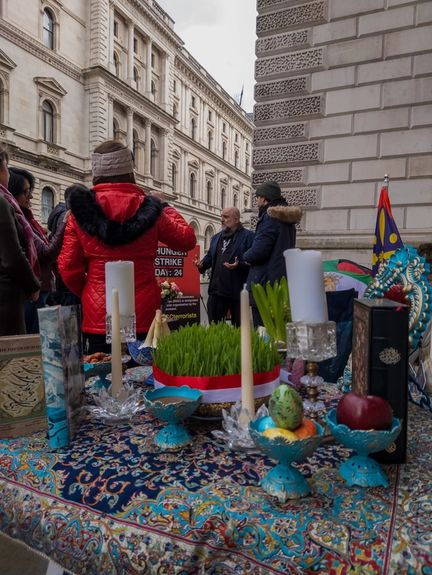Jewish Committee Formed To Support Iran’s Protest Movement
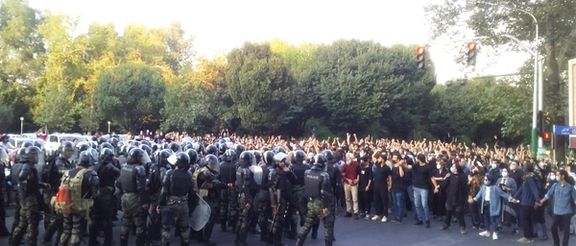
A group of former and incumbent diplomats as well as rights activists have established a Jewish Committee to support ‘Woman, Life, Freedom’ movement in Iran.

A group of former and incumbent diplomats as well as rights activists have established a Jewish Committee to support ‘Woman, Life, Freedom’ movement in Iran.
The group, which announced its establishment on Friday, said that its mission is “to connect the American Jewish community with the Iranian diaspora to support their efforts to amplify the voices, vision, and dreams of the Iranian people in Western capitals.”
The Jewish Committee also says it will promote grassroots support for the Iranian diaspora protesters and will also be raising funds within the American Jewish community to offer microgrants to support protest activities around the world.
“The history of organized American Jewry has reflected the core Judaic values of justice, respect, community, and repairing the world... Those same Judaic values inspire the creation of a committee to support the Woman Life Freedom movement and the people of Iran who face death and torture in the cause of freedom,” the groups added.
Several former US senators and representatives such as Joseph Lieberman, Norm Coleman, Eric Fingerhut, and Ted Deutch as well as two former US ambassadors to the UN, Mark D. Wallace and Dennis Ross, are among the nearly 20 founding members of the committee.
“With governments, news media, and activists distracted by global events, there has been inadequate support for the Iranian people in the face of the brutal human rights abuses by the Iranian regime," the committee underlined. “It is critical to recognize this historic movement in Iran and to help sustain its momentum."
The US is home to 60-80,000 Iranian Jews, the second largest diaspora community after Israel, home to around 250,000, most of whom fled in the years following the revolution. Just 10,000 Jews remain in Iran today.
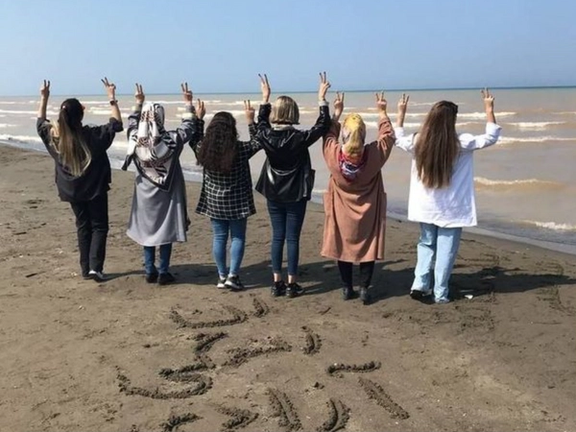
Since Mahsa Amini was beaten to death by hijab enforcers in September, sparking nationwide revolt, the simple act of unveiling in public has been a thorn in the side of the regime.
Despite numerous new measures to curb the trend, more women are daring to be seen without headscarves on streets, in public buildings, and on social media, shaking the foundations of the theocratic dictatorship to the core.
Life after the Mahsa Amini incident will never be the same. For many, the hijab has gone for good but the country’s hardliners will not relent in their battle.
In a determined statement on Thursday, the Islamic Republic’s Interior Ministry described the hijab as "one of the foundations of the civilization of the Iranian nation" and "one of the practical principles of the Islamic Republic.”
"There has not been and will not be any retreat or tolerance in religious principles and rules and traditional values, and hijab, as an unquestionable religious necessity, will always be one of the practical principles of the Islamic Republic of Iran," read the statement.
But, never have Iranians been forced to cover their hair throughout their millennia-old culture, and the Islamic Republic – along with Taliban Islamist extremist group in Afghanistan — is the only Muslim country with such a strict interpretation of hijab and nationwide coercive measures for its observance.
The unrest created since the death in morality police custody of 22-year-old Mahsa Amini has made it increasingly difficult to enforce the mandatory Islamic dress code which has become a symbol of revolution.
The tide against the hijab was never as strong as it is today. Anti-hijab campaigns such as ‘White Wednesdays’, ‘Girls of Enghelab Street’, ‘No to Mandatory Hijab’, and ‘Sneaky Freedoms’, have been branded plots by “the enemy” to disrupt the idea in the minds of Iranian women.
The mere existence of so many campaigns against the obligatory dress code is indicative of its low popularity among the people.
In addition to the regime suggesting that the anti-hijab movement is "one of the axes of the enemies’ cognitive war against the nation”, the Interior Ministry has also called the “Women, Life, Liberty” -- the main motto of the current wave of anti-regime protests – a “demagogic slogan” devised by the intelligence agencies of adversaries to conceal their evil intentions.

The conspiratorial statement - typical of the regime rhetoric - claimed that the schemes of the movement have been foiled but the people but did not explain that if such is the case, why the Islamic Republic has been intensifying measures to enforce hijab. Workshops and seminars are being pushed on women to quash the female-led uprising against the regime’s hackneyed propaganda lines.
The ministry has also incited numerous clashes as it urged organizations as well as ordinary citizens to confront women who unveil in public, emboldening the hardliners to attack women and girls with loose-fitting hijab in public because they know the authorities will back them in courts if the rows lead to judicial cases.
Earlier in the week, it was announced that women could be fined as much as $60,000 for flouting hijab observance when a new law to enforce the Islamic dress code is passed by parliament.
These penalties will apply to passengers who do not abide by the hijab rules everywhere from in private vehicles to schools, restaurants and even in cyberspace. Nobody is above the law either, celebrity or otherwise, said lawmaker Hossein Jalali.
As surveillance intensifies, the regime also plans to use CCTV cameras and facial recognition technology to identify women who flout the hijab, and use cash fines and social restrictions to punish them including blocking their bank account and banning them from internet access or using governmental services.
Since the death of Mahsa Amini, the morality police may have had to step back from public life somewhat, but the swell of rebellion remains a bitter pill for the regime to swallow as they seek new means of oppression.
Four decades after the Islamic Republic forced women to wear headscarves, it is clear that change is afoot. Who knows what will be in the near future, but the tide has turned and no matter the levels of oppression and surveillance, there is no doubt there is no going back. The regime is fighting a losing battle and it has lost the hearts and minds of its people.
Women are prepared to sacrifice their lives to ensure the futures of the next generation and we are witnessing a resilience even the tools of dictatorship seem unable to quash.
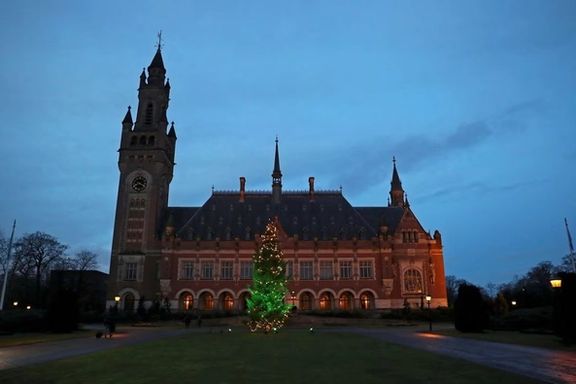
The International Court of Justice (ICE) on Thursday rejected Tehran’s legal bid to free up $1.75 billion of the Islamic Republic’s assets frozen by US court rulings.
In a 10-5 majority decision, judges said the UN International Court of Justice did not have jurisdiction to rule on the Iranian claim linked to the assets of the Central Bank of Iran (CBI) that were blocked to be paid in compensation to victims of a 1983 bombing in Lebanon and other attacks linked to the Islamic Republic. The CBI’s frozen assets of $1.75 billion in bonds, plus accumulated interest, are held in a Citibank account in New York.
The court found that the US move to seize assets of Iran and Iranians in the United States breached a treaty between the countries, signed in 1955, about 24 years before the establishment of the Islamic Republic. However, it ruled that it did not have jurisdiction based on the 1955 Treaty of Amity in the case of CBI’s funds because it is not a commercial enterprise, and thus not protected by the treaty.
The ICE judges accepted American lawyers’ contentions that the frozen central bank assets were state holdings not covered by the treaty, but ruled that assets belonging to non-government, commercial entities should be protected.

Iran argues the asset freeze was a breach of the 1955 Treaty of Amity, which promised friendship and cooperation between the two countries, even though the US and Iran have had no diplomatic relations since militant students took over the US Embassy in Tehran in 1979. Moreover, Washington terminated the Treaty of Amity in 2018 in response to an order by the International Court of Justice in a separate case to lift some sanctions against the Islamic Republic. Nonetheless, the ICE ruled that the treaty was in place at the time of the freezing of the assets of Iranian commercial companies and entities.
In its 67-page judgment on Thursday, the court also ruled that Washington had illegally allowed courts to freeze assets of some Iranian companies and ordered Washington to pay compensation, the amount of which should be negotiated between the countries. If they fail to reach a number, they will have to return to the Hague-based court for a ruling.
"The court has concluded the United States violated its obligations under (...) the treaty of amity," presiding judge Krill Georgian said. He added that Iran was entitled to compensation and the parties had 24 months to agree on a figure and if that did not work, the court would start new proceedings to determine the amount to be paid.
The court’s judgments are final and legally binding but the United Nations' top court has no means of enforcing them.
At hearings in September 2022, the Islamic Republic called the asset freeze an attempt to destabilize the Islamic Republic and a violation of international law. Tehran took its claim to the world court in 2016 after the US Supreme Court ruled that money belonging to Iran’s central bank could be used as compensation for the 241 American troops who died in the 1983 bombing. After the bombing of the US military base in Lebanon, a second blast nearby killed 58 French soldiers. Tehran has denied involvement, but a US District Court judge found Tehran responsible in 2003. The judge’s ruling said Iran’s ambassador to Syria at the time called “a member of the Iranian Revolutionary Guard – IRGC -- and instructed him to instigate the Marine barracks bombing.”
Acting Legal Adviser Rich Vise of the US State Department said in a written statement that the ruling rejected the "vast majority of Iran's case," notably where it concerned the assets of the central bank, adding that "This is a major victory for the United States and victims of Iran’s state-sponsored terrorism."
Iran's foreign ministry also reacted to the Thursday ruling, hailing the decision as "highlighting the legitimacy" of its positions and "expressing the wrongful behavior of the United States".
Tehran’s talks with world powers to revive the 2015 nuclear deal – officially known as the Joint Comprehensive Plan of Action (JCPOA) -- was going on with some vague prospects of success but ultimately collapsed after Russia invaded Ukraine. Russia was an active player in the talks from April 2021 to February 2022, when it invaded Ukraine. The negotiations in Vienna ended in early March. Some Iranian observers suggest that the West is not likely to respond to Iran's renewed calls for nuclear talks unless Tehran stops supplying weapons to Moscow in its war.
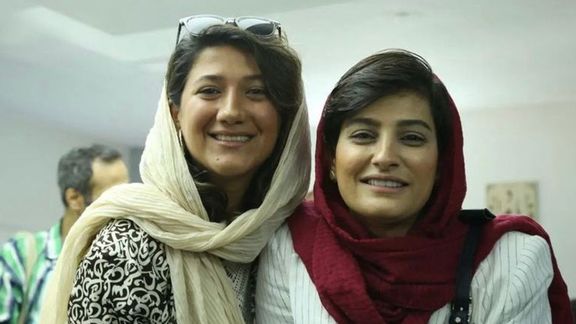
Two imprisoned journalists have been awarded Harvard’s Lyons Award for Conscience and Integrity in Journalism while they serve time for reporting the death of Mahsa Amini.
Niloofar Hamedi and Elahe Mohammadi were arrested six months ago for coverage relating to the controversial death of the young Iranian-Kurd, who died in morality police custody, sparking months of nationwide protests.
The Nieman Fellows Foundation for Journalism at Harvard University honored the journalists, who worked for Shargh and Hammihan respectively, for their “steadfast commitment to producing courageous journalism”.
“Hamedi and Mohammadi put their livelihoods and lives on the line, and lost their freedom in the process,” said the statement. “They knew the grave risks they might face but remained committed to telling Amini’s story. Journalists in Iran are risking their lives on a daily basis to report on the conditions and oppression there.”
Since the protests began around 70 journalists have been arrested and many others warned about their coverage of dissent and their public comments.
The Nieman Fellows will honor Hamedi and Mohammadi in absentia during a ceremony this spring.
The Nieman class of 1964 established the Louis M. Lyons Award in honor of the Nieman Foundation curator who retired that year after leading the institution for a quarter of a century. Lyons was a forceful advocate for freedom of the press.
The two Iranians join a long list of over 1,700 journalists from 100 countries to have been awarded Nieman Fellowships since 1938.
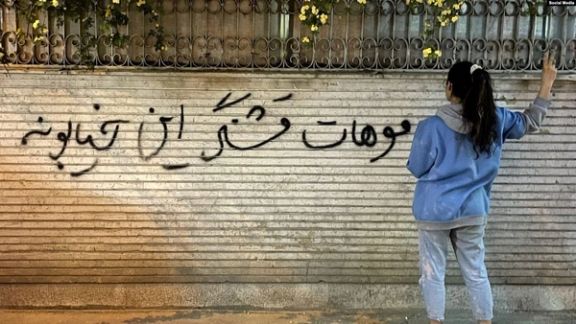
An Iranian attorney says several victims of government brutality in the recent protests in Iran have filed legal complaints in several provinces of the country.
Payam Dorafshan told Emtedad News that these people filed a complaint after visiting a lawyer and presenting sufficient evidence.
According to attorney, Majid Khademi, Mir-Hesam Maleki, Reza Ezzati and Pouria Alipour are among the plaintiffs.
Explaining how these people were injured during the protests, Dorafshan said Majid Khademi had gone to the graveyard to offer condolences to the family of a victim, but "on his way back, he was shot from an unknown place and injured in one eye.”
Maleki went out to the street to move his car, but "he was shot in the face from a very close distance with a teargas launcher. Due to the severity of the injury, the bones of the upper and lower jaw and his teeth were completely crushed."
As Dorafshan stated, Maleki "has been undergoing various surgeries for months and has only been able to feed using a straw."
The Iranian lawyer also added that Reza Ezzati, who had gone to visit the grave of his relatives in a cemetery in Karaj west of Tehran, was "hit by many [bird]shots" on the way, and in addition to “eyes and face, even a few shots entered his body and heart.”
Ezzati "was forced to undergo heart surgery and currently one of his eyes has a severe vision defect while a large number of shots remain in his body."
Dorafshan has also asked other families of the deceased and injured to contact lawyers to file a lawsuit.

During the recent protests, ignited by the death in custody of 22-year-old Mahsa Amini in September 2022, hundreds of people lost their lives and many more received permanent injuries. The authorities of the Islamic Republic not only failed to accept any responsibility, but put pressure on some of the victims' families who made statements against regime officials during funerals or on social networks.
Activist twitter and Instagram account '1500 Tasvir,' dedicated to news about protests in Iran, has recently published a large batch of harrowing photos and videos of people shot or killed by the regime. The regime’s security forces have been extensively using cartridges of shotshell loaded with numerous small balls or birdshots, or medium-sized buckshots as well as single large solid projectiles known as a slug to quash the nationwide protests.
Late in November 2022, dozens of ophthalmologists issued a joint letter warning against the use of shotgun ‘birdshots’ and other projectiles by Iran’s security forces that have blinded over 500 protesters since mid-September. According to them, a large number of victims were taken to medical centers hit by rubber bullets and metal pellets as well as paintball bullets in their eyes, leading to loss of eyesight in one or both eyes.
The Islamic Republic, which had been previously condemned for blinding protesters in the streets, intensified the use of guns, including military weapons against unarmed protesters. However, young Iranians who lost one or both eyes say they do not regret having protested against the regime.
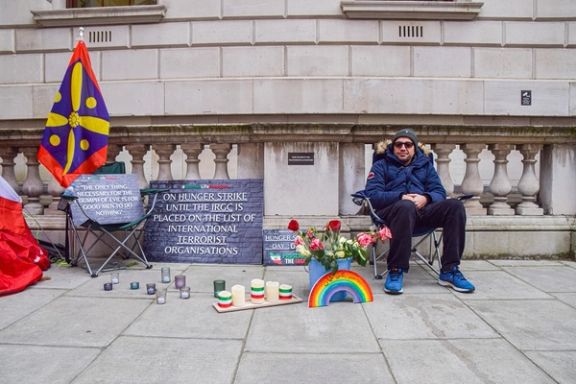
After 35 days on hunger strike, a dual British-Iranian citizen's campaign calling on the UK government to designate the IRGC is finally gaining ground.
Vahid Beheshti has been battling the bitter winter outside the UK Foreign Office to raise awareness for the need to designate the Iranian terror group responsible for the deaths of hundreds of Iranian citizens since September.
He has got the attention of key political figures and has been joined by supporters hoping to force the UK government to take action on the brutal security forces.
On Monday, he met with the Minister of State for Security, Tom Tugendhat. Beheshti said, "He expressed his concerns for my health and emphasized that the Government's position is to proscribe the IRGC, but could not share the timescale in which this would happen."
His simple camp outside the Foreign Office has become a meeting place for activists, with others joining him.
His campaign has proven so successful that his name has been frequently mentioned during the sessions of the UK House of Commons. He has repeatedly urged UK lawmakers to hold official meetings with him instead of unofficial visits to his corner, to raise the profile of the issue to the highest echelons
Beheshti’s campaign is even reaching back home.
A boy in Iran holds a placard that urges Beheshti to break his hunger strike
As his body is getting weaker, temperatures at night dropping to freezing, his determination is growing stronger as he has vowed not to break the strike until the IRGC is listed as a terrorist organization.
The 46-year-old journalist is surviving on a daily diet of one cup of coffee, a few cubes of sugar, some salt and “plenty of water”.
“A policy of appeasement with Iran's Islamic Revolutionary Guard Corps has not worked in the last 44 years, and it will never work going forward,” Beheshti said last week, calling on Sunak, for “strong leadership” and to stand by his pledge to designate the group before his recent election.
Before embarking on his hunger strike, Beheshti held several meetings with British lawmakers, pleading with them for the proscription, but no action was made.
The tipping point came in February when Iran International was forced to close its London studios after repeated death threats from the regime.“The main point I highlight to British politicians is that their country’s principles are under threat today... I cannot understand why the British police, with all their power, cannot protect journalists against IRGC threats,” Beheshti said.
The Revolutionary Guard is the Islamic Republic’s leading military, intelligence and internal security juggernaut, responsible for cracking down on dissent inside Iran and managing the proxy militias throughout the region including the Houthis in Yemen which have caused devastation to the country.
Beheshti has been actively raising the voice of Iranians among the international community with his numerous interviews, speeches and video messages to global events on the uprising in Iran.
He says the designation is the first practical step toward further isolation of the Islamic Republic and the final overthrow of the regime.
Rallies against the IRGC have taken place globally including just last week in Brussels. The UK’s current list of 78 proscribed terrorist organizations includes Hamas, Hezbollah, and the Kurdistan Workers Party (PKK).
Several countries including the US, UK and EU have been cautious to designate the IRGC for fear it will further alienate the regime and in turn, limit negotiating capacity regarding its nuclear program.
In December, members of the UK House of Commons unanimously voted for a motion that urges the government to proscribe the IRGC but it has split the House.
Prominent Iranian opposition figures have repeatedly called on London to blacklist the Guards with exiled Prince Reza Pahlavi describing the move as to be akin to “pulling out the regime’s biggest tooth.”
